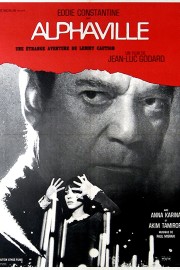Alphaville
Like the last few films I’ve reviewed in this series- as well as the one I will be reviewing next week- the most dangerous thing at work in Jean-Luc Godard’s surrealist parable “Alphaville” is free will. Originally the most groundbreaking of the members of the French New Wave- now more the most polarizing- Godard conceived of a combination of sci-fi and film noir that not only paid tribute to films past (like “Metropolis” and “The Big Sleep”) but also seems to have influenced future films like “Blade Runner” and “Dark City.”
But the film remains in a class by itself, not because it’s better than any of these films (it’s not really), but because of how Godard put his singular stamp on it. I’ll admit to not being terribly familiar with a lot of his films (this and “Breathless” are the only ones I’ve seen), but it’s not hard to see what made him so influential to so many filmmakers to come.
“Alphaville” takes place in a future world where artificial intelligence has evolved into a force to be reckoned with. Our introduction into this world is the character of Lemmy Caution (Eddie Constantine), a secret agent from the Outlands undercover as a reporter. His mission is to capture and kill the inventor of Alpha 60, the computer that controls Alphaville, and has turned it into a fascist society.
But what strange misadventures await Lemmy Caution (the film’s subtitle, “A Strange Case of Lemmy Caution,” is completely appropriate). He’s encountered with hotel workers whose sole purpose seems to be sexual companionship. He visits the slums of Alphaville, where further come-ons are experienced, and a contact has vital information for him before the contact dies. And then he’s taken on a guided tour of Alphaville by Natasha Vonbraun (Anna Karina), the daughter of Alpha 60’s creator, although she’s never met him. Long story on that one. Just know that like everyone else in Alphaville, Natasha has been “programmed” by Alpha 60 to not be an individual in the traditional sense. Crying is outlaw, as is individual thought- we witness a strange execution ritual where free thinkers and expressions of emotions are dealt with by way of death.
Godard’s commentary in the film is crystal clear. By not making Alphaville the city appear futuristic, the implication is that modern society is the dehumanizing factor in our eventual downfall. And our reliance on technology will be be a contributing factor in it. But part of what makes Godard’s vision so intriguing and entertaining is in watching Caution introduce Natasha to the emotions of life through things such as poetry, but in the times we see Caution “face to face,” so to speak, with Alpha 60. Alpha 60 is one of those “only in the movies” supercomputers (like Hal in “2001,” and other descendants like in “I, Robot” and “Eagle Eye”) that knows all (including when you lie), but cannot really understand why we act the way we do. The monotonous voice of Alpha 60 is heard frequently throughout the film, and its’ unsettling nature in how static it is hints at the world according to Godard.
But anyone expecting a joyless commentary by the above description will be pleasantly surprised by how oddly enjoyable the film is, as it is first and foremost a thriller in the classic noir vein. A lot of that has to do with the music, which pays tribute to that venerable American genre (named by New Wavers like Godard and Truffaut). It’s a shames scores like this one are damn-near impossible to find anywhere, because if there’s one aspect that has always led me to appreciate “Alphaville,” it’s Paul Misraki’s” score. There’s nothing particularly innovative in it, but it just has a particular character to it that works very well with Godard’s vision of the film. If you haven’t seen a Godard film before, this may not be the best one you ever see, but from what I’ve heard, there would be worse places to start.










